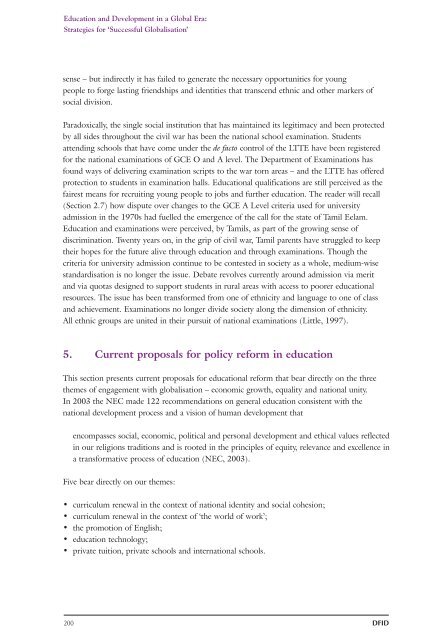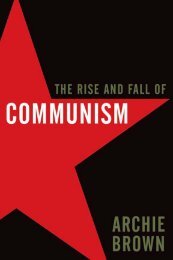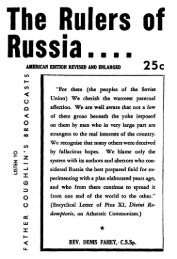- Page 1 and 2:
Researching the Issues200769Educati
- Page 3 and 4:
Education and Development in a Glob
- Page 5 and 6:
Education and Development in a Glob
- Page 7 and 8:
Education and Development in a Glob
- Page 9 and 10:
Education and Development in a Glob
- Page 11 and 12:
Education and Development in a Glob
- Page 13 and 14:
Education and Development in a Glob
- Page 16 and 17:
List of AcronymsList of AcronymsAIC
- Page 18 and 19:
List of AcronymsSPARCSSASSASTTEVTTV
- Page 20 and 21:
Executive SummaryExecutive SummaryT
- Page 22 and 23:
Executive Summaryseveral decades la
- Page 24 and 25:
Executive SummaryOur studies of Eas
- Page 26 and 27:
Chapter 1: Introduction - Andy Gree
- Page 28 and 29:
Chapter 1: Introduction - Andy Gree
- Page 30 and 31:
Chapter 1: Introduction - Andy Gree
- Page 32 and 33:
1. IntroductionChapter 1: Education
- Page 34 and 35:
Chapter 1: Education, Globlisation
- Page 36 and 37:
Chapter 1: Education, Globlisation
- Page 38 and 39:
Chapter 1: Education, Globlisation
- Page 40 and 41:
Chapter 1: Education, Globlisation
- Page 42 and 43:
Chapter 1: Education, Globlisation
- Page 44 and 45:
Chapter 1: Education, Globlisation
- Page 46 and 47:
Chapter 1: Education, Globlisation
- Page 48 and 49:
Chapter 1: Education, Globlisation
- Page 50 and 51:
Chapter 1: Education, Globlisation
- Page 52 and 53:
Chapter 1: Education, Globlisation
- Page 54 and 55:
Chapter 1: Education, Globlisation
- Page 56 and 57:
Chapter 1: Education, Globlisation
- Page 58 and 59:
Chapter 1: Education, Globlisation
- Page 60 and 61:
Chapter 1: Education, Globlisation
- Page 62 and 63:
Chapter 1: Education, Globlisation
- Page 64 and 65:
Chapter 1: Education, Globlisation
- Page 66 and 67:
Chapter 1: Education, Globlisation
- Page 68 and 69:
Chapter 1: Education, Globlisation
- Page 70 and 71:
Chapter 1: Education, Globlisation
- Page 72 and 73:
Chapter 1: Education, Globlisation
- Page 74 and 75:
1. IntroductionChapter 2: China’s
- Page 76 and 77:
Chapter 2: China’s Uneven Develop
- Page 78 and 79:
Chapter 2: China’s Uneven Develop
- Page 80 and 81:
Chapter 2: China’s Uneven Develop
- Page 82 and 83:
Chapter 2: China’s Uneven Develop
- Page 84 and 85:
Chapter 2: China’s Uneven Develop
- Page 86 and 87:
Chapter 2: China’s Uneven Develop
- Page 88 and 89:
Chapter 2: China’s Uneven Develop
- Page 90 and 91:
Chapter 2: China’s Uneven Develop
- Page 92 and 93:
Chapter 2: China’s Uneven Develop
- Page 94 and 95:
Chapter 2: China’s Uneven Develop
- Page 96 and 97:
Chapter 2: China’s Uneven Develop
- Page 98 and 99:
Chapter 2: China’s Uneven Develop
- Page 100 and 101:
Chapter 2: China’s Uneven Develop
- Page 102 and 103:
Chapter 2: China’s Uneven Develop
- Page 104 and 105:
Chapter 2: China’s Uneven Develop
- Page 106 and 107:
Chapter 2: China’s Uneven Develop
- Page 108 and 109:
Chapter 2: China’s Uneven Develop
- Page 110 and 111:
Chapter 2: China’s Uneven Develop
- Page 112 and 113:
Chapter 2: China’s Uneven Develop
- Page 114 and 115:
Chapter 3: Walking the Tightrope: E
- Page 116 and 117:
Chapter 3: Walking the Tightrope: E
- Page 118 and 119:
Chapter 3: Walking the Tightrope: E
- Page 120 and 121:
Chapter 3: Walking the Tightrope: E
- Page 122 and 123:
Chapter 3: Walking the Tightrope: E
- Page 124 and 125:
Chapter 3: Walking the Tightrope: E
- Page 126 and 127:
Chapter 3: Walking the Tightrope: E
- Page 128 and 129:
Chapter 3: Walking the Tightrope: E
- Page 130 and 131:
Chapter 3: Walking the Tightrope: E
- Page 132 and 133:
Chapter 3: Walking the Tightrope: E
- Page 134 and 135:
Chapter 3: Walking the Tightrope: E
- Page 136 and 137:
Chapter 3: Walking the Tightrope: E
- Page 138 and 139:
Chapter 3: Walking the Tightrope: E
- Page 140 and 141:
Chapter 3: Walking the Tightrope: E
- Page 142 and 143:
Chapter 3: Walking the Tightrope: E
- Page 144 and 145:
Chapter 3: Walking the Tightrope: E
- Page 146 and 147:
Chapter 3: Walking the Tightrope: E
- Page 148 and 149:
Chapter 3: Walking the Tightrope: E
- Page 150 and 151:
Chapter 3: Walking the Tightrope: E
- Page 152 and 153:
Chapter 3: Walking the Tightrope: E
- Page 154 and 155:
Chapter 3: Walking the Tightrope: E
- Page 156 and 157:
1. IntroductionChapter 4: Promise U
- Page 158 and 159:
Chapter 4: Promise Unfulfilled: Edu
- Page 160 and 161:
Chapter 4: Promise Unfulfilled: Edu
- Page 162 and 163:
Chapter 4: Promise Unfulfilled: Edu
- Page 164 and 165:
Chapter 4: Promise Unfulfilled: Edu
- Page 166 and 167:
Chapter 4: Promise Unfulfilled: Edu
- Page 168 and 169:
Chapter 4: Promise Unfulfilled: Edu
- Page 170 and 171:
Chapter 4: Promise Unfulfilled: Edu
- Page 172 and 173:
Chapter 4: Promise Unfulfilled: Edu
- Page 174 and 175: Chapter 4: Promise Unfulfilled: Edu
- Page 176 and 177: Chapter 4: Promise Unfulfilled: Edu
- Page 178 and 179: Chapter 4: Promise Unfulfilled: Edu
- Page 180 and 181: Chapter 4: Promise Unfulfilled: Edu
- Page 182 and 183: Chapter 4: Promise Unfulfilled: Edu
- Page 184 and 185: Chapter 4: Promise Unfulfilled: Edu
- Page 186 and 187: Chapter 4: Promise Unfulfilled: Edu
- Page 188 and 189: 1. IntroductionChapter 5: Paradoxes
- Page 190 and 191: Chapter 5: Paradoxes of Economic an
- Page 192 and 193: Chapter 5: Paradoxes of Economic an
- Page 194 and 195: Chapter 5: Paradoxes of Economic an
- Page 196 and 197: Chapter 5: Paradoxes of Economic an
- Page 198 and 199: Chapter 5: Paradoxes of Economic an
- Page 200 and 201: Chapter 5: Paradoxes of Economic an
- Page 202 and 203: Chapter 5: Paradoxes of Economic an
- Page 204 and 205: Chapter 5: Paradoxes of Economic an
- Page 206 and 207: Chapter 5: Paradoxes of Economic an
- Page 208 and 209: Chapter 5: Paradoxes of Economic an
- Page 210 and 211: Chapter 5: Paradoxes of Economic an
- Page 212 and 213: Chapter 5: Paradoxes of Economic an
- Page 214 and 215: Chapter 5: Paradoxes of Economic an
- Page 216 and 217: Chapter 5: Paradoxes of Economic an
- Page 218 and 219: Chapter 5: Paradoxes of Economic an
- Page 220 and 221: Chapter 5: Paradoxes of Economic an
- Page 222 and 223: Chapter 5: Paradoxes of Economic an
- Page 226 and 227: Chapter 5: Paradoxes of Economic an
- Page 228 and 229: Chapter 5: Paradoxes of Economic an
- Page 230 and 231: Chapter 5: Paradoxes of Economic an
- Page 232 and 233: Chapter 5: Paradoxes of Economic an
- Page 234 and 235: Chapter 6: Conclusions - Andy Green
- Page 236 and 237: Chapter 6: Conclusions - Andy Green
- Page 238 and 239: Chapter 6: Conclusions - Andy Green
- Page 240 and 241: Chapter 6: Conclusions - Andy Green
- Page 242 and 243: Chapter 6: Conclusions - Andy Green
- Page 244 and 245: Chapter 6: Conclusions - Andy Green
- Page 246 and 247: Chapter 6: Conclusions - Andy Green
- Page 248 and 249: BibliographyBibliographyABAGI, O. (
- Page 250 and 251: BibliographyBHALLA, S. (2003) The R
- Page 252 and 253: BibliographyDALE, R. and ROBERTSON,
- Page 254 and 255: BibliographyESPING-ANDERSEN , G. (1
- Page 256 and 257: BibliographyGRIES, P.H. (2004) Chin
- Page 258 and 259: BibliographyJAMES, H. (2001) The En
- Page 260 and 261: BibliographyKINGDON, G. G. (1999)
- Page 262 and 263: BibliographyLIU, Q.L., WANG, J.P. a
- Page 264 and 265: BibliographyMUNSHI, K. and ROSENZWE
- Page 266 and 267: BibliographyPERERA, L., WIJETUNGE,
- Page 268 and 269: BibliographyREPUBLIC of KENYA (2003
- Page 270 and 271: BibliographySISCI F. (2005) ‘Is C
- Page 272 and 273: BibliographyUNDP (1999) Kenya Human
- Page 274 and 275:
BibliographyWORLD BANK (2003b) Chin
- Page 276 and 277:
IndexIndexAfricanisation, 144, 161A
- Page 278 and 279:
Index96-7, 110, 127; unorganised, 3
- Page 280 and 281:
NotesDFID 255
- Page 282:
DFID’s headquarters are located a





